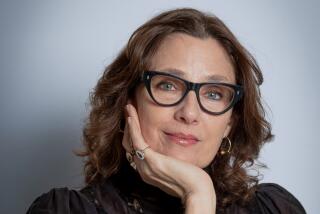Life of a Salesman: Remembering the Other Arthur Miller
- Share via
My father was a salesman named Arthur Miller, and the playwright’s death last week reminded me of this irony. It prompted me to think about what’s in a name and what makes a life.
After attending the University of Michigan (four years behind the other Arthur Miller), my dad sold gasoline and tires in his native Iowa, then packed his wife and children into a 1960 station wagon and, like so many before him, headed West to pursue the dream of a better life. He had a discount tire and bicycle business in Northern California before it went bust, then moved south to sell machine tools to defense and aerospace companies.
My parents had first encountered the Arthur Miller mystique during their honeymoon trip to California. This was back when women still wore white gloves to shop downtown and always used their husband’s name. My mother made an appointment at a Beverly Hills hair salon for Mrs. Arthur Miller, and arrived to find the place atwitter. When she presented herself, faces dropped all around and my mother realized they had been expecting Marilyn Monroe. “You think you’re disappointed, imagine how my husband feels,” she cracked.
My dad was happy to take advantage of the Arthur Miller name. When he called to make a restaurant reservation and an aspiring actor on the line asked, “Are you the Arthur Miller?” he had no compunction about saying yes if it would yield a table. Often it did, and he would hang up with a cat-ate-the-canary smile, saying, “I know how to write.”
More often, however, it was the Willy Loman character from “Death of a Salesman” who dogged my dad. As for so many men who came of age in World War II, income and self-worth went hand in hand for this Arthur Miller. He worked hard to keep his head above water and was disappointed in himself for not earning more.
There were plenty of differences between Loman and my dad. Among them, Loman bought a house in New York and was an employee in someone else’s firm, while Dad rented an apartment in Santa Monica and was self-employed. But they shared some of the same values and suffered similar humiliations. Loman needed to be not just liked but “well-liked,” and felt betrayed by a company that consumed the fresh pulp of his productive years and tossed him out like an orange peel. Dad wanted to be known as an honest man and, never fully adapting to the rough-and-tumble of big-city business, felt betrayed when others outfoxed him, playing fast and loose with the rules.
Dad was kind and witty, but that meant less to him than his dream of driving an expensive American car and giving my mom the baubles he saw on other men’s wives. Mostly he wanted the respect that he believed came with money.
He loved his family. But when we fought over politics, he thought we didn’t respect him. Having served in the Army, he was infuriated by my brother’s threats to move to Canada if he drew a low draft number during the Vietnam War. He said he had sent me to college to find a husband and couldn’t understand why I didn’t want to buy life insurance at 18 for my future children. “I don’t plan to have a husband or children,” I protested.
My defiance was a rejection of his life, and the ultimate disrespect. But then I got married, had children, bought insurance.
Santa Monica grew wealthier by the decade, but my dad did not. As aerospace and defense contractors shut their doors, Dad drove farther and farther every month to close a deal. He was happy when he had “a lot of irons in the fire,” but as time went on he grew more and more frustrated and withdrawn. Unless he was around salespeople.
My father loved to talk to grocers and cashiers and door-to-door salesmen. We ended up with countless items we didn’t need. He couldn’t say no. The closest he ever came was one night during dinner in the 1960s when a salesman rang the doorbell to peddle magazine subscriptions, and we heard Dad say, “I’m sorry, but this is my Uncle Harry Kavarne’s house, and he’s in Guatemala.” Forever after, Uncle Harry remained an absent member of our family.
More typically, Dad bought a hideous plaster donkey from a hawker at the Tijuana-San Diego border crossing.
“Oh look, that’s beautiful,” he said to elicit our laughter. “I’m going to buy one.
“How much?” he shouted out the window and over our protests. He bargained the price up, trying to make us laugh even louder, but you could tell it was because the poor salesman broke his heart.
Unlike Willy Loman, my dad died of natural causes. But long before that, I think he, like Willy, died a thousand deaths as sales failed to deliver on the American dream.
More to Read
Sign up for The Wild
We’ll help you find the best places to hike, bike and run, as well as the perfect silent spots for meditation and yoga.
You may occasionally receive promotional content from the Los Angeles Times.






